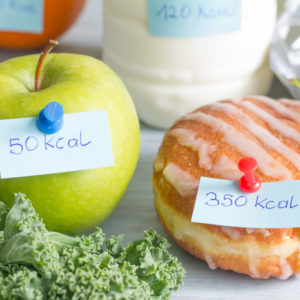
Learn what is a calorie, how your body processes it, how many calories you need, and how all of this contributes to a healthy weight!
Calorie has become a household word, although it is still a mystery to many people exactly what a calorie does. Ask one hundred people what a calorie is and most will tell you it is “the thing in food that makes me fat.” Calories have gotten a bad reputation and are often considered the enemy. Few people truly understand what a calorie is and why it is so important to their bodies, so we’re here to give you the facts.
What is a calorie?
By definition a calorie is the energy it takes to raise the temperature of 1 kilogram of water 1 degree Celsius. This is why you will sometimes see kcal as an abbreviation for calories – it meals kilocalories. The important word to take away from this definition is ENERGY. Calories are ENERGY that fuel our bodies- much like gasoline fuels our cars. Without sufficient calories our heart would not beat, our lungs would not function, and our brain would not work. Many people underestimate how many calories our body needs just to exist.
How many calories do you and your kids need?
An adult body needs to have enough energy to fuel key organs like the brain, heart, and lungs at rest. This minimum number of calories is called your resting metabolic rate (RMR) and it varies greatly depending on age, sex, weight, and muscle mass. However, in order to have enough energy to live your day and be active, you need more energy than what’s required from your resting metabolic rate (RMR). This extra energy typically amounts to about 400 to 600 additional calories per day (which can be even higher depending on activity level) and is the energy you need to move and fuel your fitness, versus just lying still all day.
Please note that these numbers are general averages and a Registered Dietitian can help you determine exactly how many calories your body needs. As your children age, their needs change based on age. ChooseMyPlate.gov has some guidelines for a general overview to get you in the know, with some tips on meals and snacks! The 2015-2020 Dietary Guidelines for Americans also have a very helpful chart to estimate your total needs for the day based on all ages!
Calories and weight gain
If you exceed the number of calories your body requires each day you will eventually gain weight. It takes an excess of approximately 3,500 calories to gain 1 lb. of fat. For example, if your body needs 2,000 calories a day to maintain its current weight, and every day you consume 2,500 calories (one 20 oz Mocha Swirl Latte could add 500 calories), in one week you would gain 1 lb. Keep in mind that one day of overindulging does not cause instant weight gain – everyday habits make the biggest difference in the long run!
Calories and weight loss. What is a calorie deficit?
To lose weight you need to use/burn more calories then you consume. For example, if you eat 2,000 calories a day, and are maintaining your weight, you would theoretically need to burn 250 calories per day to lose 1/2 lbs. in one week. This can be achieved through low, moderate, or high-intensity aerobic exercise, depending on the duration of your workout. If, in addition, you decreased your caloric intake by 250 calories a day (a 20 oz soda), a 500 calorie a day total deficit, you could then lose 1 lb per week. As with anything else for energy needs and energy burning, keep in mind that everyone’s bodies respond differently, and sometimes it takes trial and error to find the perfect balance that works for you!
 Is there a limit to how much you can restrict calories?
Is there a limit to how much you can restrict calories?
It’s important to remember that although drastically reducing your calories in a short period of time may initially result in dramatic weight loss, the body can rarely continue along this restrictive path, especially if the person is consuming below their resting metabolic rate. Eating later to make up for those missing calories usually results in gaining back the weight lost, plus extra. And, if you force your body to restrict calories for a prolonged amount of time, your metabolism will slow down to compensate–effectively stopping weight loss.
Should you reduce your child’s calorie intake?
While children are growing, rarely is calorie restriction indicated and only under strict medical and nutritional supervision for children with other health-related problems. Overweight children are encouraged to meet with a Registered Dietitian to learn how to eat healthier while growing into their weight. As with most things in life, moderation is the key. Moderate caloric intake combined with moderate exercise will help you achieve and maintain your natural, healthy weight, and stay there.
So remember: calories are our friends! They are what gives us the energy to play with our children, excel in our careers, enjoy our friends and family, and live life to the fullest. You can’t live without them but choose healthy foods to make sure your calories are packed with disease-fighting nutrients to keep you feeling healthy and young!












